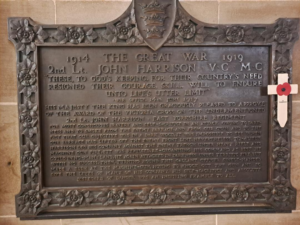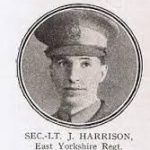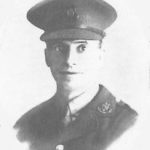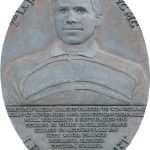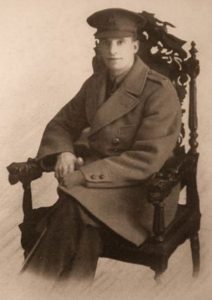
Born Hull on the 12th November 1890, at 20 Williamson Street, East Hull. Eldest Son of John and Charlotte Harrison, of “Ainslie House”, Southcoates-Lane, East Hull. Jack was the son of a boilermaker and plater. He had six sisters and grew up in a tough and austere background and soon learned to look after himself. Jack was to become one of the most famous Hull Pals. Before the war he had been a well-known rugby league player. Already an ever-present in football, cricket, tennis, swimming and athletics, it was his sprinter’s speed and strong build that encouraged York to sign him in the 1911/12 season. Returning to Hull, to take up a teaching post in 1912, he signed for the Hull NURFC, stepping out in the famous black & white irregular hoops, on 5 September 1912. During that date and up to 1916, Jack played 116 matches for Hull FC, scoring 106 tries and two goals, playing on the wing. In the 1913/14 Challenge Cup Final, Jack scored one of Hull’s two tries, in the defeat of Wakefield Trinity. In the following season, he scored 52 tries, including five tries in one match and tries in eleven consecutive matches, a club record that still stands today. As a player, Jack had it all. He was renowned for his powerful running and turning defence into attack. He could “side step” off both feet and had a natural body swerve, combined with a fine turn of speed, which enabled him to make tries where others failed. His modest nature on the field was noticed by everyone and even after a brilliant and successful scoring effort he was almost too embarrassed to face the applause of the spectators.
Jack enlisted with the Pals in 1915, and was promoted to 2nd Lieutenant, on 5th August 1916, when his active service began in France. Jack was posted to 6 platoon of the 11th Battalion East Yorkshire Regiment as a (temporary) 2nd Lieutenant. The Brigade was stationed on the western front in the Somme area. The whole front saw an average of three hundred men killed daily. In February 1917 the Hull brigade entered the front line once again and Jack was soon in the thick of the action. On the 25th March 1917, Jack led a patrol into no-man’s land and in this action he was awarded the Military Cross. His Military Cross (MC) citation, reads, “for conspicuous gallantry and devotion to duty. He handled his platoon with great courage and skill, reached his objective under the most trying conditions, and captured a prisoner. He set a splendid example throughout.”
Later in 1917, Jack Harrison was ordered to attack Oppy Wood, which had been captured by Germans earlier in the year. Smoke from shelling and shadows from the wood made it impossible to see objectives. Jack continued on with his men, but found that they were opposed by heavy gunfire. Armed with a revolver and grenade, he moved swiftly across the obstacles of “No Mans” land and single handedly knocked out a German machine gun, saving the lives of many of his men. Jack Harrison was killed during this action, and was never seen again. He was awarded the Victoria Cross (VC) for his bravery. His Colonel in a letter wrote:-
“The work he and his men did on May 3rd was most praiseworthy and I shall find it most difficult to replace him. He was always loved by his men and always cheery under the most adverse circumstances. I feel very much for you in your great anxiety and hope that we may hear of him being a prisoner.” The Army Chaplain added “Everybody loved Jack. He was so straight, so true, so brave, and his men simply worshipped him.”
75, Wharncliffe Street, Hull, was Jack’s Probate address. Apart from his rugby, Jack was also a Teacher at Lime House school, Hull . He left a widow Lillian and one young son. A funeral for him was held at St Mary’s church Lowgate, and was attended by all Hull’s dignitaries. He is commemorated by a bronze plaque in Hull City Council’s Guildhall, and another memorial to 27 Hull teachers lost in WW1.
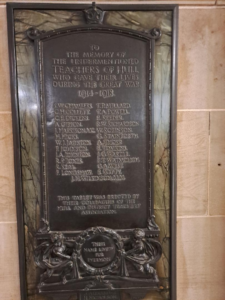
Jack’s wife Lillian was presented with his Victoria Cross at Buckingham Palace by King George V in March 1918 and, like thousands of other women, found herself alone and with a young son to bring up. A fund was raised in Hull to provide for young John’s education and he went on to serve as an officer in the 2nd World War. He was killed in the defence of Dunkirk and is buried in the Dunkirk town cemetery. Lillian Harrison, a lady who had lost both her husband and son to war, passed peacefully away on 5th December 1977. Lillian left his medals to the East Yorkshire Regimental Museum in Beverley, which is now incorporated into The Museum of The Prince of Wales Own Regiment of Yorkshire in Temple Street, York.
A Memorial fund was established and a memorial plinth erected at the KC Stadium home of Hull FC, on V.E. Day, 11th December, 2003. Fundraising continues to enable an annual tournament in which local children having to overcome disadvantage, will play for the Jack Harrison VC Memorial Trophy.
By all accounts, Jack Harrison was an outstanding athlete, a splendid Officer and an extraordinary citizen of Hull. His story was told in a play, at Park Street performance Centre, Hull on 11th November, 2019. His brother in law, George Ellis, died of wounds, received in action of 30th April 1917, aged 25. Before the war, he was an apprentice hairdresser at Waltham Street, Hull. (Hull Daily Mail 10/05/1917).
Below are some more information links.
http://hullwebs.co.uk/content/k-victorian/people/jack-harrison/jack-harrison.htm
https://en.wikipedia.org/wiki/Jack_Harrison_(VC)
http://www.hullandeastridingatwar.co.uk/index.php/ourheroes/ww1/harrisonvc
http://www.ajbooth.karoo.net/hullfcrecords/hullswingthreequarter.html
